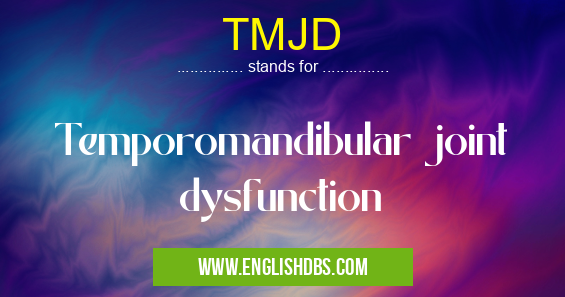What does TMJD mean in MEDICAL
TMJD is an abbreviation that stands for Temporomandibular Joint Dysfunction. It refers to a range of conditions that affect the temporomandibular joint (TMJ), which connects the lower jaw (mandible) to the skull. TMJD can cause a variety of symptoms, including jaw pain, clicking or popping in the joint, difficulty opening or closing the mouth, and headaches.

TMJD meaning in Medical in Medical
TMJD mostly used in an acronym Medical in Category Medical that means Temporomandibular joint dysfunction
Shorthand: TMJD,
Full Form: Temporomandibular joint dysfunction
For more information of "Temporomandibular joint dysfunction", see the section below.
Causes
The causes of TMJD are not fully understood, but it is thought to be caused by a combination of factors, including:
- Trauma to the face or jaw
- Overuse of the TMJ, such as from grinding or clenching your teeth
- Misalignment of the bite
- Certain medical conditions, such as arthritis or fibromyalgia
Symptoms
- Jaw pain
- Stiffness or soreness in the jaw
- Clicking or popping in the jaw joint
- Difficulty opening or closing the mouth
- Headaches
- Earaches
- Pain in the face, neck, or shoulders
Diagnosis
TMJD is diagnosed based on a physical examination and a review of your symptoms. Your dentist or doctor may also order imaging tests, such as an X-ray or MRI, to confirm the diagnosis.
Treatment
Treatment for TMJD depends on the severity of your symptoms and the underlying cause. Treatment options may include:
- Conservative treatments, such as pain relievers, ice packs, and jaw exercises
- Splint therapy, which involves wearing a device that fits over your teeth to help reposition the jaw
- Surgery, which is rarely necessary
Essential Questions and Answers on Temporomandibular joint dysfunction in "MEDICAL»MEDICAL"
What is TMJD?
Temporomandibular joint dysfunction (TMJD) refers to a group of conditions that affect the jaw joint and the muscles that control it. It can cause discomfort, pain, and difficulty opening and closing the mouth.
What are the causes of TMJD?
TMJD can result from various factors, including:
- Misalignment of the jaw
- Injury or trauma to the jaw
- Clenching or grinding teeth
- Arthritis in the jaw joint
- Stress or tension
What are the symptoms of TMJD?
Symptoms of TMJD may include:
- Pain or tenderness in the jaw, face, or neck
- Clicking or popping sounds when opening or closing the mouth
- Difficulty opening or closing the mouth
- Headaches
- Earaches
- Facial swelling
How is TMJD diagnosed?
Diagnosis of TMJD involves:
- A physical examination of the jaw and surrounding area
- A review of symptoms
- Imaging tests, such as X-rays or MRI scans
How is TMJD treated?
Treatment for TMJD depends on the severity of the condition and may include:
- Medications to reduce pain and inflammation
- Physical therapy to strengthen and improve range of motion in the jaw
- Dental appliances, such as mouthguards or splints
- In severe cases, surgery may be necessary
Final Words: TMJD is a common condition that can cause a variety of symptoms. Treatment for TMJD depends on the severity of your symptoms and the underlying cause. If you are experiencing any of the symptoms of TMJD, it is important to see your dentist or doctor for diagnosis and treatment.
TMJD also stands for: |
|
| All stands for TMJD |
